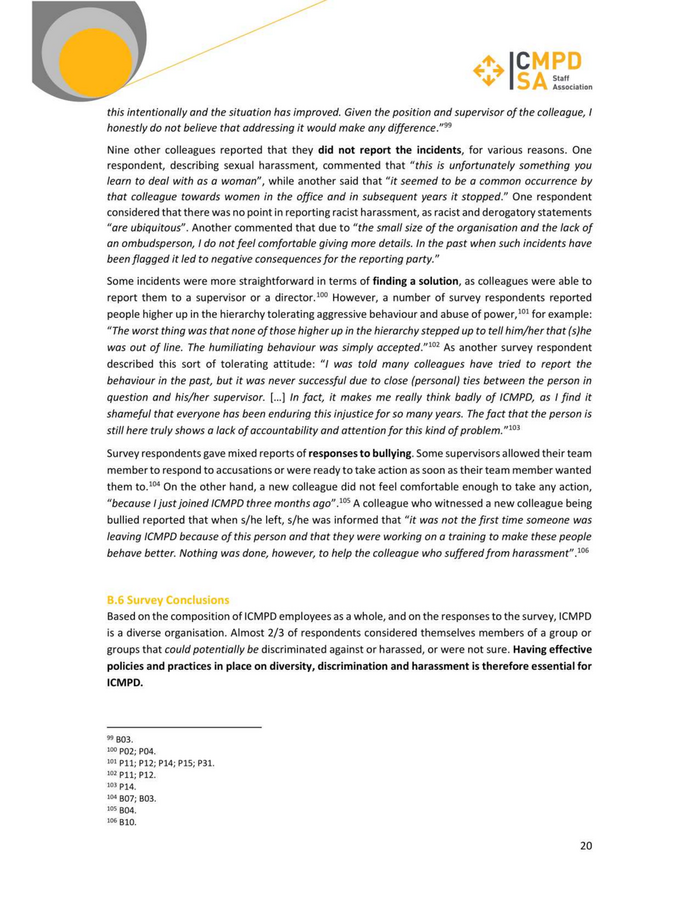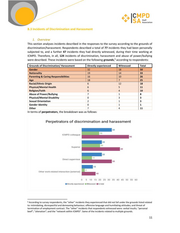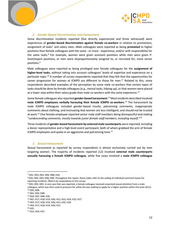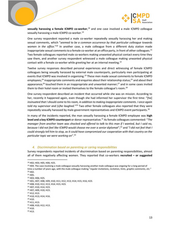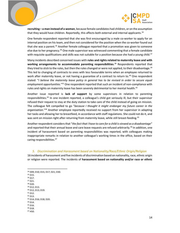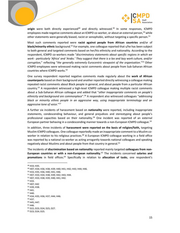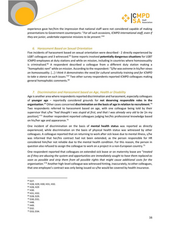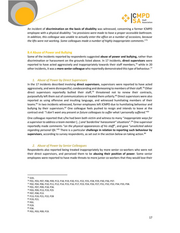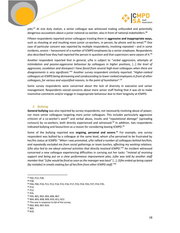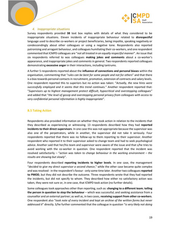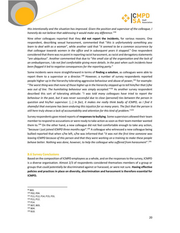ICMPD: Diversity Working Group Final Report with Recommendations
18 October 2019
*, ICMPD
ISA Mia
B.3 Incidents of Discrimination and Harassment
1. Overview
This section analyses incidents described in the responses to the survey according to the grounds of
discrimination/harassment. Respondents described a total of 77 incidents they had been personally
subjected to, and a further 47 incidents they had directly witnessed, during their time working at
ICMPD. Therefore, in all, 124 incidents of discrimination, harassment and abuse of power/bullying
were described. These incidents were based on the following grounds,® according to respondents:
Grounds of Discrimination/ Harassment Directiy experienced | witnessed |Total |
es
N
Racial/Ethnic Origin 6 18
Physical/Mental Health 6 5 11
Religion/Faith 6 4 10
Abuse of Power/Bullying 7 1 8
Physical/Mental Disability 0 3 3
Sexual Orientation 2 1 3
Gender Identity 0 1 1
Other 7 4 11
In terms of perpetrators, the breakdown was as follows:
Perpetrators of discrimination and harassment
33
ICMPD colleague
52
Superior
Direct supervisor
Other work-related interaction (external)
“
-
nn -
n
-
a
0 5 10 15 20 25 30 35 40 45 50 55 60
@Directiy experienced ® Witnessed @in total
6 According to survey respondents, the “other” incidents they experienced that did not fall under the grounds listed related
to: intimidating, disrespectful and demeaning behaviour; offensive language and humiliating attitudes; and threat of
termination of employment contract. The “other” incidents that respondents witnessed were: verbal insults; “personal
beef”; “alienation”; and the “network within ICMPD“. Some of the incidents related to multiple grounds.
11
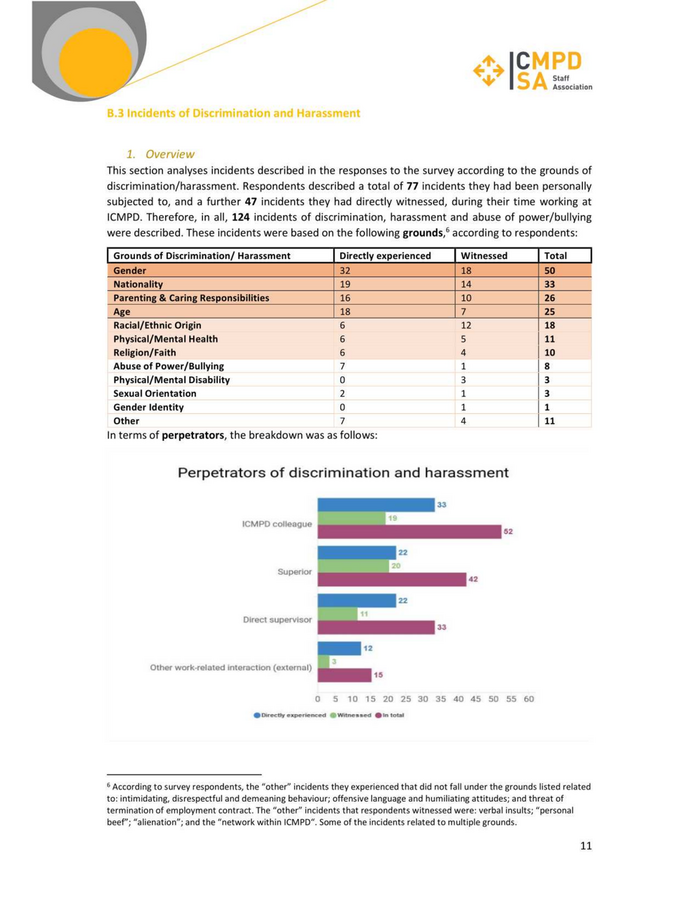
+, ICMPD ISA Me 2. Gender-Based Discrimination and Harassment Some discrimination incidents reported (five directly experienced and three witnessed) were experiences of gender-based discrimination against female co-workers in relation to promotions, assignment of tasks’ and salary rates. Male colleagues were reported as being promoted to higher positions than female colleagues with the same - or more - experience, and/or with responsibility for the same tasks.® For example, women were given assistant positions while men were given P- level/expert positions, or men were disproportionately assigned to, or recruited for, more senior positions.? Male colleagues were reported as being privileged over female colleagues for the assignment of higher-level tasks, without taking into account colleagues’ levels of expertise and experience on a particular topic. A number of survey respondents reported that they felt that the opportunities for career progression for women at ICMPD are different to those for men.'! Related to this, some respondents described examples of the perception by some male co-workers that certain types of tasks should be done by female colleagues (e.g., menial tasks, tidying up), or that women were placed at a lower step within their salary grade than male co-workers with the same experience.'? Some female colleagues also reported gender-based harassment.'? Most incidents described involved male ICMPD employees verbally harassing their female ICMPD co-workers.'* The harassment by male ICMPD colleagues included gender-based insults, patronising comments, inappropriate comments about clothing, and insinuating that women are less intelligent, and should not be trusted at work.!° One female employee reported senior male staff members being disrespectful and making “condescending comments, mostliy towards junior female staff members, including myself.”'° Three incidents of gender-based harassment by external male counterparts were reported, including a donor representative and a high-level event participant, both of whom grabbed the arm of female ICMPD employees and spoke in an aggressive and patronising tone.'’ 3. Sexual Harassment Sexual harassment as reported by survey respondents is almost exclusively carried out by men targeting women. The majority of incidents reported (12) involved external male counterparts sexually harassing a female ICMPD colleague, while five cases involved a male ICMPD colleague ” D01; DO3; DO5; D06; DO8; H26. 8 D01; DO2; DO3; D06; D08. Throughout this report, these codes refer to the coding of individual comment boxes for reporting incidents, filled in by respondents to the survey. ° D01; DO2; DO3. In one case that was reported, a female colleague received unwanted sexual attention from a male colleague, which was then used to pressure her while she was seeking to apply for a higher position within the team (D11). 10 D05; DO8. 11 D01; DO3; DO8. 12 D04; D07; DO8; H26. 13 407; H17; H18; H19; H20; H21; H22; H24; H25; H27. 14 407; H17; H18; H19; H20; H21; H25; H26. 15 H03; H17; H18; H19; H20; H21. 16 425. 17 422; H24; H27. 12
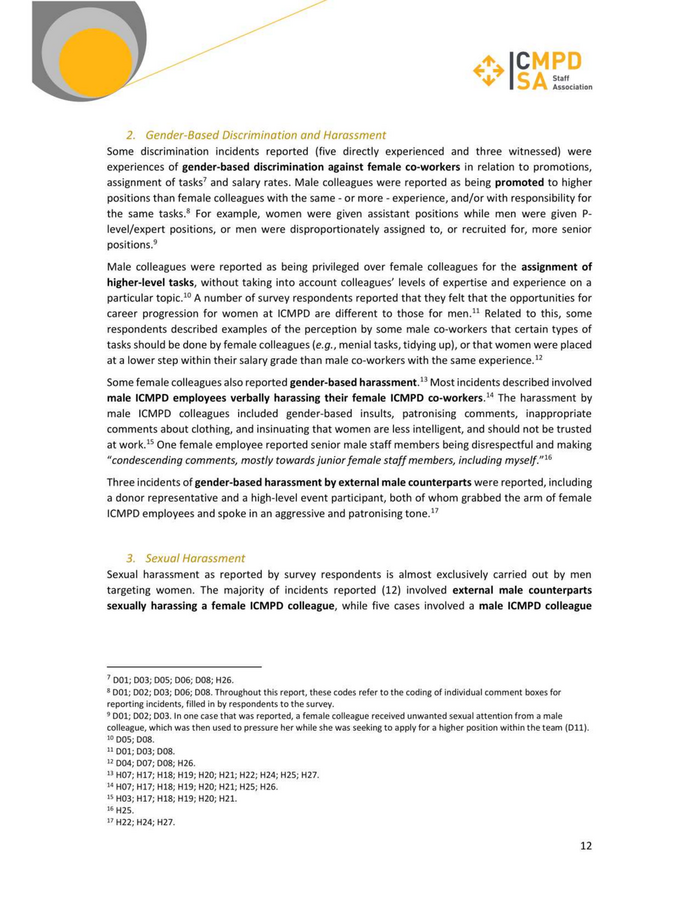
ui pr +, ICMPD ee ISA... sexually harassing a female ICMPD co-worker,'® and one case involved a male ICMPD colleague sexually harassing a male ICMPD co-worker.”? One survey respondent reported a male co-worker repeatediy sexually harassing her and making sexual comments, which “seemed to be a common occurrence by that particular colleague towards women in the office.”?” In another case, a male colleague from a different duty station made inappropriate sexual comments to a female co-worker at an office party, in front of other colleagues.?! Two female colleagues reported male co-workers making unwanted physical contact every time they saw them, and another survey respondent witnessed a male colleague making unwanted physical contact with a female co-worker while greeting her at an internal meeting. ?? Twelve survey responses described personal experiences and direct witnessing of female ICMPD colleagues being sexually harassed by external male counterparts, particularly men participating at events that ICMPD was involved in organising.”” These men made sexual comments to female ICMPD employees;?* inappropriate comments and enquiries about their relationship status;?° and about their appearance;?® touched them in an inappropriate and unwanted manner;?’ and in some cases invited them to their hotel room or invited themselves to the female colleague’s room.?® One survey respondent described an incident that occurred while she was on mission. According to her, recently it happened again, even though she had informed her supervisor the first time: “[he] insinuated that I should come to his room, in addition to making inappropriate comments. lonce again told my supervisor and (s)he laughed.”??” Two other female colleagues also reported that they were repeatedly sexually harassed by male government representatives and ICMPD event participants.?’ In many of the incidents reported, the man sexually harassing a female ICMPD employee was high level and a key ICMPD counterpart or donor representative.’' As female colleagues commented: “The manager from another team was shocked and offered to talk to this man if I wanted, but I said no, because I did not feel like ICMPD would choose me over a senior diplomat”;?? and “I did not feel that I could strongly tell him to stop, as it could have compromised our cooperation with that country on the particular topic we were working on”.°? 4. Discrimination based on parenting or caring responsibilities Survey respondents reported incidents of discrimination based on parenting responsibilities, almost all of them negatively affecting women. They reported that co-workers recruited — or suggested 18 402; HO3; H05; H06; H25. 19 404. The case involving a male colleague sexually harassing another male colleague was ongoing for a long period of time a number of years ago, with the male colleague making “regular invitations, incitation, hints, graphic comments, etc.” 20 HO2. 21 H0S. 22 H03; H06; H25. 23 H01; H07; H08; H09; H10; H11; H12; H13; H14; H15; H16; H23. 24 408; H10; H12; H13; H14; H15; H23. 25 H07; H10; H14; H23. 256 H07; H09; H10; H23. 27 H12; H13. 28 H10; H13; H14; H16. 22 H10. 30 411; H13. 31 408; H10; H12; H13. 32 410. 33 413. 13
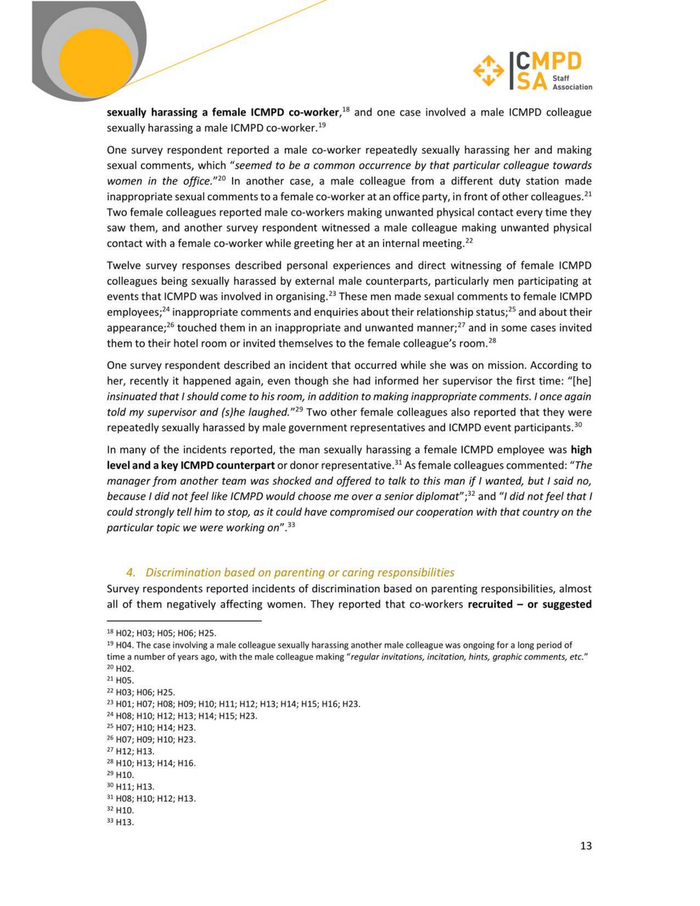
ui pr +, ICMPD ee ISA... recruiting- a man instead of a woman, because female candidates had children, or on the assumption that they would have children. Reportedly, this affects both external and internal applicants.** One female respondent reported that she was first encouraged by a male co-worker to apply for an internal position on his team, and then not considered for the position when the co-worker found out that she was a parent.°° Another female colleague reported that a promotion was given to someone else due to her pregnancy.°® One male supervisor was witnessed commenting that a female candidate with requisite qualifications and skills was not suitable for a position because she had a young child.?” Many incidents described concerned issues with rules and rights related to maternity leave and with working arrangements to accommodate parenting responsibilities.°® Respondents reported that they tried to stick to the rules, but then the rules changed or were not applied, to their disadvantage.”” This led to changing of contracts to ones with less favourable terms when an employee returned to work after maternity leave, or not having a guarantee of a contract to return to.“ One respondent stated: “/ believe the maternity leave policy in general has to be revised in order to secure equal employment opportunities.”*" One respondent reported that such an incident of non-compliance with rules and rights on maternity leave has been severely detrimental to her mental health.*? Another issue reported is lack of support by some supervisors in relation to parenting responsibilities.*” In one incident reported, a colleague’s child got seriously ill, but their supervisor refused their request to stay at the duty station to take care of the child instead of going on mission. The colleague felt compelled to go “because I thought it might endanger my future career in the organisation.”** Another employee reportedly received no support from her supervisor in adapting her tasks and allowing her to breastfeed, in accordance with staff regulations. She could not do it, and was sent on mission right after returning from maternity leave, while still breast-feeding.”® Another respondent considers that “the fact that Ihave to care for a child is viewed as a disadvantage” and reported that their annual leave and care leave requests are refused arbitrarily.“® In addition, one incident of harassment based on parenting responsibilities was reported, with colleagues making inappropriate remarks in relation to another colleague’s working times in the office, based on their caring responsibilities.*’ 5. Discrimination and Harassment based on Nationality/Race/Ethnic Origin/Religion 16 incidents of harassment and five incidents of discrimination based on nationality, race, ethnic origin or religion were reported. The incidents of harassment based on nationality and/or race or ethnic 34 D09; D10; D15; D17; D21; D30. 35 D15. 36 D17. 37 D21. 38 D20. 39 D12; D13. “0 D12; D13; D19., 41012. 22013. 43 D14; D16; D18; D20. “4 D14. 45 D16. 45 D18. 47 450. 14
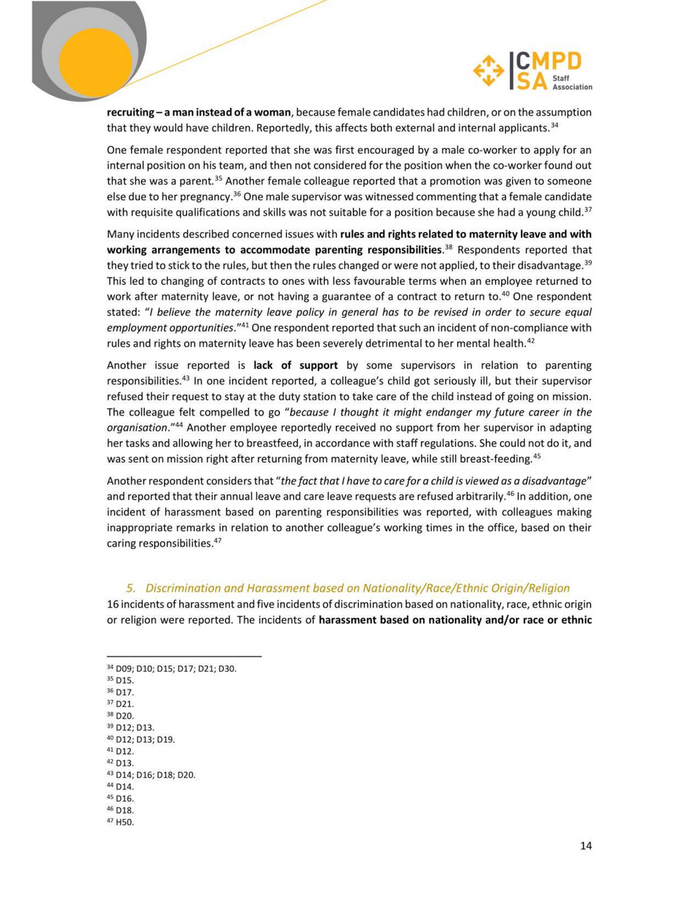
Bu Pe «,|CMPD VISA Seesen origin were both directly experienced”® and directly witnessed.*” In some responses, ICMPD employees made negative comments about an ICMPD co-worker, or about an external person, while other statements were generally biased, racist or xenophobic, without targeting a specific person.°' ui Most such comments reported were racist against people from African countries and/or of black/minority ethnic background.°? For example, one colleague reported that s/he has been subject to both general and targeted comments based on her/his ethnicity and nationality. According to the respondent, ICMPD co-workers made “discriminatory statements about specific regions in which we work - particularly ‘Africa’ and ‘Arabs.’ They suggest that there is a lax and lazy work culture, and/or corruption,” reflecting “the generally extremely Eurocentric viewpoint of the organisation.”°® Other ICMPD employees were witnessed making racist comments about people from Sub-Saharan African countries where ICMPD works.°* One survey respondent reported negative comments made regularly about the work of African counterparts based on their background and another reported directly witnessing a colleague making repeated racist comments about Black people in general, and about people from a particular African country.°° A respondent witnessed a high-level ICMPD colleague making multiple racist comments about a Sub-Saharan African colleague and added that “other inappropriate comments on people's ethnicity and background are commonplace”.°® A respondent also witnessed colleagues “addressing black or minority ethnic people in an aggressive way, using inappropriate terminology and an aggressive tone of voice.”?’ A further six incidents of harassment based on nationality were reported, including inappropriate statements, condescending behaviour, and general prejudices and stereotyping about people’s professional capacities based on their nationality.°® One incident was reported of an external European partner behaving in a condescending manner towards a non-European ICMPD colleague.°® In addition, three incidents of harassment were reported on the basis of religion/faith, targeting Muslim ICMPD colleagues. One colleague reportedly made an inappropriate comment to a Muslim co- worker in relation to his religious practices.°” A European ICMPD colleague working in a field office was reported by a national co-worker as acting arrogantly towards national colleagues and speaking negatively about Muslims and about people from that country in general.°! The incidents of discrimination based on nationality reported mainly targeted colleagues from non- European countries or with a non-European nationality.°” The incidents concerned salaries and promotions in field offices.°” Specifically in relation to allocation of tasks, one respondent’s 48 433; H35. #9 H07; H34; H36; H38; H39; H40; H41; H42; H43; H44; H46. 50 433; H35; H36; H40; H41; H46. 51 407; H33; H34; H38; H39; H42; H43; H44. 52 407; H33; H38; H39; H40; H41; H42. 53 433, 54 407; H42 55 H39; H38. 56 H41. 57 440. 58 H34; H35; H36; H37; H44; H46. 59 H37. 60 445; H47. 61 H46. 62 D22; D23; D24; D25; D27. 63 D23; D24; D25. 15
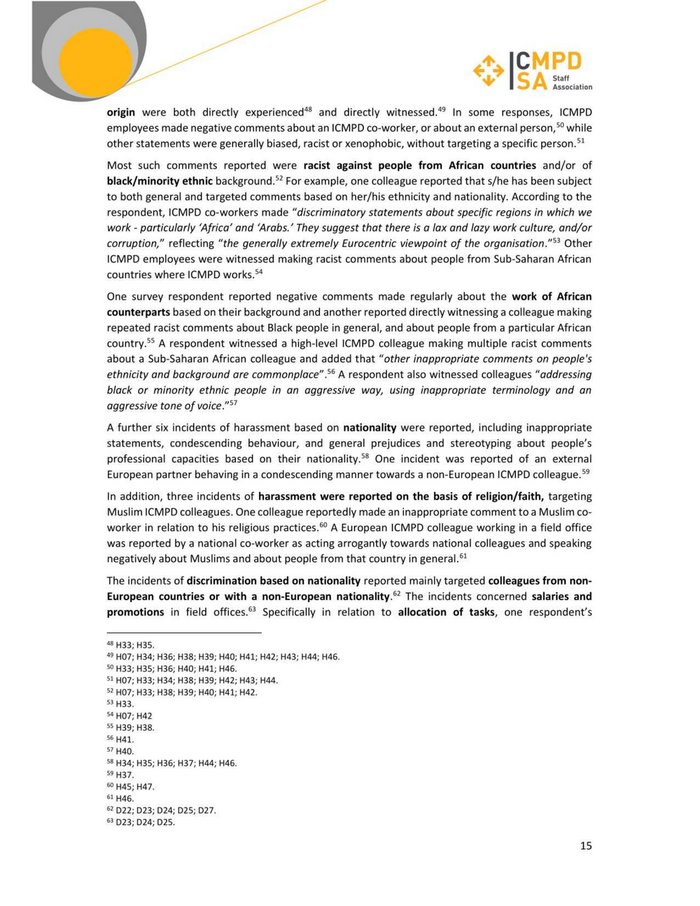
ui pr +, ICMPD ee ISA... experience gave her/him the impression that national staff were not considered capable of making presentations to Government counterparts: “For all such occasions, ICMPD international staff, even if they are junior, undertake expensive missions to be present.”** 6. Harassment Based on Sexual Orientation Five incidents of harassment based on sexual orientation were described - 2 directly experienced by LGBT colleagues and 3 witnessed.°° Some reports involved potentially dangerous situations for LGBT ICMPD employees at duty stations and while on mission, including in countries where homosexuality is criminalised.°° A respondent described a colleague from a different duty station making a “homophobic rant” while on mission. According to the respondent: “S/he was extreme in his/her views on homosexuality. |[...] I think it demonstrates the need for cultural sensitivity training and for ICMPD to take a stance on such issues.”°’ Two other survey respondents reported ICMPD colleagues making general homophobic comments.‘® 7. Discrimination and Harassment based on Age, Health or Disability Age is another area where respondents reported discrimination and harassment, especially colleagues of younger age — reportediy considered grounds for not deserving responsible roles in the organisation.‘°® Other cases concerned discrimination on the basis of age in relation to recruitment.’ Two respondents referred to harassment based on age, with one colleague being told by their supervisor that s/he “had thought I was stupid at first, and that I was already very old to be [in my position].”’”! Another respondent reported colleagues judging her/his professional knowledge based on his/her age and appearance.’? One incident of discrimination on the basis of mental health status was reported as directly experienced, while discrimination on the basis of physical health status was witnessed by other colleagues. A colleague reported that on returning to work after sick leave due to mental illness, s/he was informed that her/his contract had not been extended, as the person responsible for HR considered him/her not reliable due to the mental health condition. For this reason, the person in question also refused to assign the colleague to work on a project in a non-European country. ’? One respondent reported that colleagues on extended sick leave or on maternity leave are “treated as ifthey are abusing the system and opportunities are immediately sought to have them replaced as soon as possible and strip them from all possible rights that might cause additional costs for the organisation.”’* Another high-level colleague was witnessed hinting, inaccurately, to other colleagues, that one employee’s contract was only being issued so s/he would be covered by health insurance. 64 D27. 65 H28; H29; H30; H31; H32. 66 H28; H29 67 H30. 68 H31; H32. 69 D28; D29. ”° D30; D31. 71 448, 72 449. 73 D32. 74 D33; D34. 16
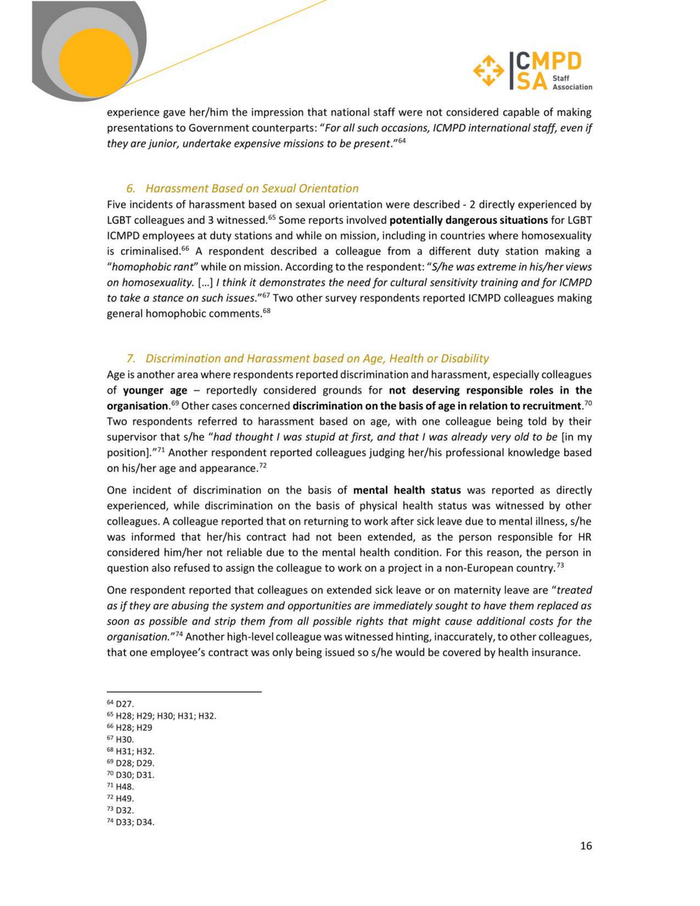
ui pr +, ICMPD ee ISA... An incident of discrimination on the basis of disability was witnessed, concerning a former ICMPD employee with a physical disability: “no provisions were made to have a proper accessible bathroom. In addition, this colleague was unable to actually enter the office on a number of occasions, because the lifts were not working. Some colleagues made a number of highly inappropriate comments.”’? B.4 Abuse of Power and Bullying Some of the incidents reported by respondents suggested abuse of power and bullying, rather than discrimination or harassment on the grounds listed above. In 17 incidents, direct supervisors were reported to have acted aggressively and inappropriately towards their staff members, ’® while in 20 other incidents, it was a more senior colleague who reportedly demonstrated this type of behaviour.’’ 1. Abuse of Power by Direct Supervisors In the 17 incidents described involving direct supervisors, supervisors were reported to have acted aggressively, and were disrespectful, condescending and demeaning to members of their staff.’”® Other direct supervisors reportediy bullied their staff,”* threatened not to renew their contracts, purposefully left them out of communications or treated them unfairly.°° Direct supervisors were also reported as using offensive and insulting language, and witnessed humiliating members of their teams.®! In two incidents witnessed, former employees left ICMPD due to humiliating behaviour and bullying by their supervisors.?? One colleague feels pushed to resign and intends to leave at the contract end: “/ don’t want any present or future colleagues to suffer what I personally suffered.”*®? One colleague reported that s/he had been both victim and witness to many “inappropriate ways for a supervisor to address a team member |...) and 'borderline' harassment” situations”.°* One supervisor reportedly made comments “on the physical appearances of his staff”, and gave “unsolicited advice regarding personal life.”®° There is a particular challenge in relation to reporting such behaviour by supervisors, according to survey respondents, as set out in the section below on taking action.?® 2. Abuse of Power by Senior Colleagues Respondents also reported being treated inappropriately by more senior co-workers who were not their direct supervisors, and perceived them to be abusing their position of power. Some senior employees were reported to have made threats to more junior co-workers that they would lose their 75 D35, 76 PO1; PO3; P07,; PO8; PO9; P13; P18; P19; P20; P21; P22; P25; P28; P29; P30,; P36; P37. 77 PO2; PO4; P06; P10; P11; P12; P14; P15; P16; P17; P23; P24; P26; P27; P31; P32; P33; P34; P35; P38. 78 PO1; PO7; PO9; P18; P36. 73 P03; PO9; P13; P19; P25 80 P07; PO8; P13. 81 P13, P19; P21; P22; P28 82 P19; P21. 33 pQ1. 84 P29. 85 P36, 86 PO1; PO3; PO9; P19. 17
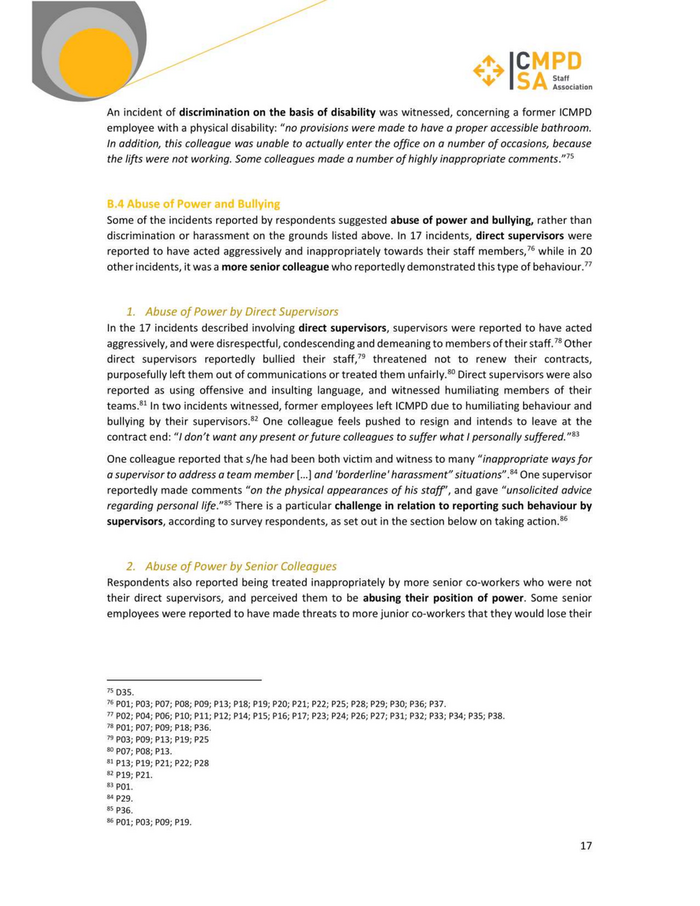
ui pr +, ICMPD ee ISA... jobs.?” At one duty station, a senior colleague was witnessed making unfounded and potentially dangerous accusations about a junior national co-worker, also in front of national stakeholders.°® Fifteen respondents reported senior colleagues treating them in aggressive and inappropriate ways, such as shouting at and insulting more junior co-workers, in person, by phone and by email.®? One case of particular concern was reported by multiple respondents, involving repeated —- and in some incidents, severe - harassment of a number of ICMPD employees by a senior employee. Respondents also described how they had reported the person in question and that supervisors were aware of it.” Another respondent reported that in general, s/he is subject to “verbal aggression, attempts at intimidation and passive-aggressive behaviour by colleagues in higher positions, |[...] the level of aggression, escalation and disrespect I have faced from several high-level colleagues when there are disagreements is very significant.”?* Another survey respondent similarly reported: “Higher-ranked colleagues at ICMPD being demeaning and condescending to lower-ranked employees in front of other colleagues, for various and unjustified reasons, to the point of humiliation” .?? Some survey respondents were concerned about the lack of diversity in executive and senior management. Respondents voiced concerns about more senior staff feeling that it was ok to make insensitive comments and/or engage in inappropriate behaviour due to their longevity at ICMPD. 3. Bullying General bullying was also reported by survey respondents, not necessarily involving abuse of power, nor more senior colleagues targeting more junior colleagues. This includes particularly aggressive criticism of a co-worker’s work? and verbal abuse, insults and “reputational damage” (spreading rumours) by co-workers, both directly experienced and witnessed.?* In addition, two respondents indicated bullying and favouritism as a reason for considering leaving ICMPD.°® Some of the bullying reported was ongoing, personal and severe.” For example, one survey respondent was bullied by a colleague at the same level, whom s/he perceived to be frustrated by her/his status at ICMPD: “When I was promoted, s/he rallied a number of colleagues behind her/him, and repeatedly excluded me from social gatherings or team lunches, affecting my working relations. S/he also lied to me about external activities that directly involved ICMPD.”?’ An incident witnessed concerned a new colleague experiencing difficulties in carrying out her tasks: “Instead of receiving support and being put on a clear performance improvement plan, (s)he was told by another staff member that "(s)he would be fired as soon as the manager was back" [...]. (S)he ended up being copied (by mistake) in emails making fun of her/him from other ICMPD staff.”?® 87 P02; P12; P38. 88 P38, 89 PO4; PO6; P10; P11; P12; P14; P15; P16; P17; P23; P24; P26; P27; P33; P35. »p14. 91 p12, 92 P35, 93 P05; B01; BO2; BO3; B06; B07. 94 804; BOS; BO8; BOY; B10; B11; B12. 95 This was in response to Q4 of the survey. 3 B03; BOS; B07; B10. 97 BOS. 98 B10. 18
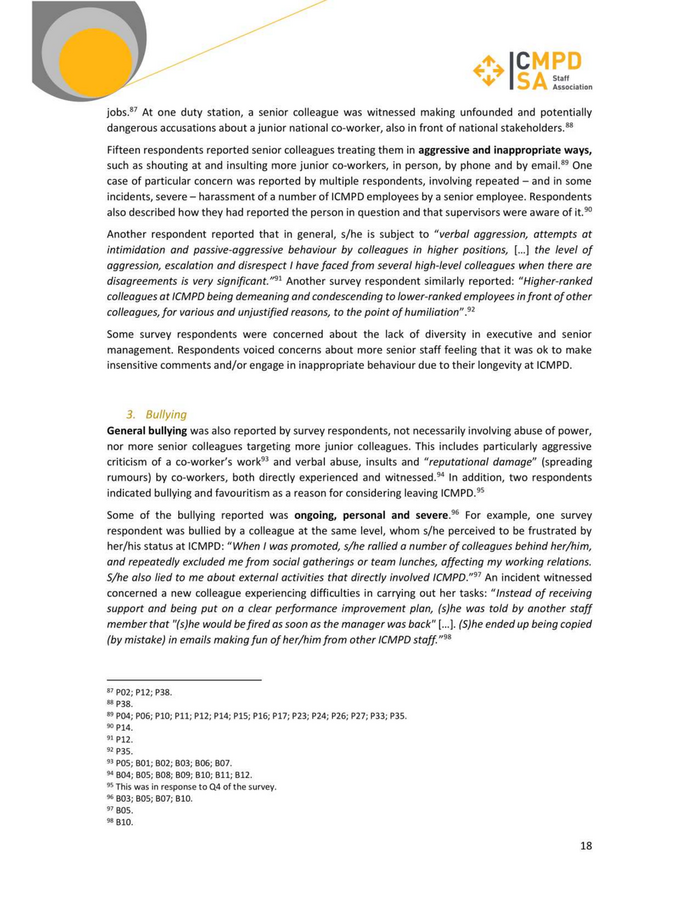
ui v 5 A An astiot 4. Inappropriate situations Survey respondents provided 38 text box replies with details of what they considered to be inappropriate situations. Eleven incidents of inappropriate behaviour related to disrespectful language used to describe co-workers or project beneficiaries, being impolite, speaking negatively or condescendingly about other colleagues or using a negative tone. Respondents also reported patronising and arrogant behaviour, and colleagues humiliating their co-workers, and one respondent commented that ICMPD colleagues are “not all treated in an equally respectful manner”. An issue that six respondents referred to was colleagues making jokes and comments about a co-worker’s appearance, and inappropriate jokes and comments in general. Two respondents reported colleagues demonstrating excessive anger in their interactions, including tantrums. A further 5 respondents reported about the influence of connections and personal biases within the organisation, commenting that “rules can be bent for some people and not for others” and that there is a bias towards personal contacts in recruitment, promotion, extension of contracts and salary levels. One respondent reported this to superiors but no action was taken: “Actually, the new hires were successfully employed and it seems that this trend continues.” Another respondent reported that: “Supervisors up to highest management protect difficult, hypocritical and overstepping colleagues” and added that “the level of gossip and overstepping personal privacy from colleagues with access to very confidential personal information is highly inappropriate”. B.5 Taking Action Respondents also provided information on whether they took action in relation to the incidents that they described as experiencing or witnessing. 13 respondents described how they had reported incidents to their direct supervisors. In one case this was not appropriate because the supervisor was also one of the perpetrators, while in another, the supervisor did not take it seriously. Four respondents reported that there was no follow-up to them reporting to their supervisor. Another respondent who reported it to their supervisor asked to change team and had to seek psychological advice. Another said that her/his team and supervisor were aware of the issue and that s/he tries to avoid working with the co-worker in question. One respondent reported that the incident was resolved satisfactorily — “action was taken to change behaviour in the working environment — the results are showing but slowIy”. Four respondents described reporting incidents to higher levels. In one case, the management “decided to give my direct supervisor a second chance,” while the other case became quite complex and was resolved - in the respondent’s favour - only some time later. Another two colleagues reported to PMOD, but they did not describe the outcome. Three respondents wrote that they had reported the incidents, but did not specify to whom. They described how either no satisfactory action was taken, they were not sure or, in one case, that ICMPD took action (no further details). Some colleagues took approaches other than reporting, such as: changing to a different team; telling the person in question to stop the behaviour — which was successful; and seeking assistance from a counsellor and an external partner; as well as, intwo cases, receiving support from other co-workers. One respondent also “took note of every incident and kept an archive of the written forms but never addressed it” directly. S/he further commented that the colleague in question “is very likely not doing 19
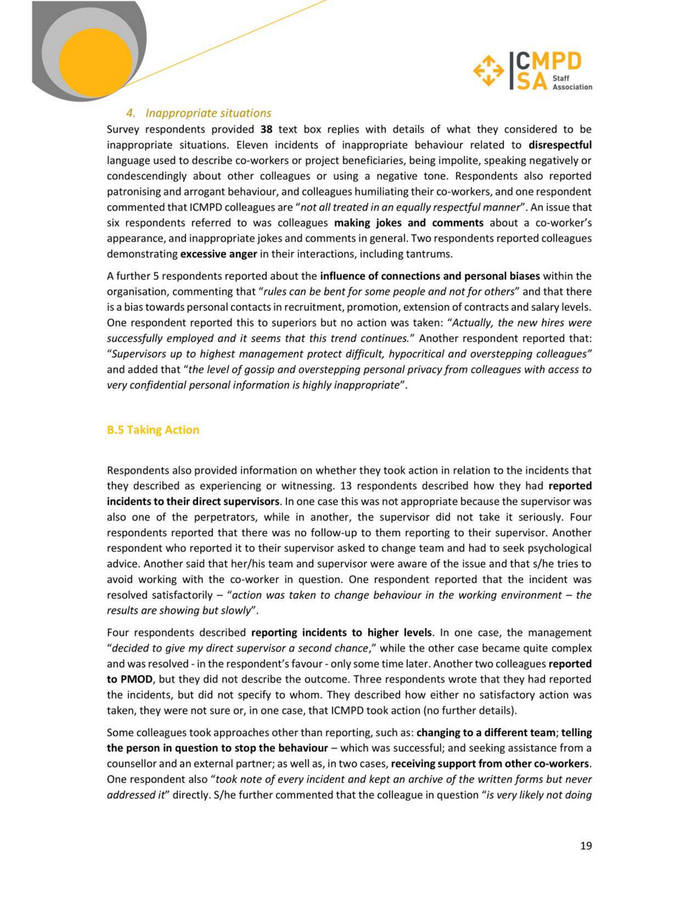
ui pr +, ICMPD Be ISA... this intentionally and the situation has improved. Given the position and supervisor of the colleague, I honestly do not believe that addressing it would make any difference.””? Nine other colleagues reported that they did not report the incidents, for various reasons. One respondent, describing sexual harassment, commented that “this is unfortunately something you learn to deal with as a woman”, while another said that “it seemed to be a common occurrence by that colleague towards women in the office and in subsequent years it stopped.” One respondent considered that there was no point in reporting racist harassment, as racist and derogatory statements “are ubiquitous”. Another commented that due to “the small size of the organisation and the lack of an ombudsperson, I do not feel comfortable giving more details. In the past when such incidents have been flagged it ledto negative consequences for the reporting party.” Some incidents were more straightforward in terms of finding a solution, as colleagues were able to report them to a supervisor or a director.!” However, a number of survey respondents reported people higher up in the hierarchy tolerating aggressive behaviour and abuse of power, !?! for example: “The worst thing was that none ofthose higher up in the hierarchy stepped up to tell him/her that (s)he was out of line. The humiliating behaviour was simply accepted.”'”* As another survey respondent described this sort of tolerating attitude: “/ was told many colleagues have tried to report the behaviour in the past, but it was never successful due to close (personal) ties between the person in question and his/her supervisor. [...] In fact, it makes me really think badly of ICMPD, as I find it shameful that everyone has been enduring this injustice for so many years. The fact that the person is still here truly shows a lack of accountability and attention for this kind of problem.” Survey respondents gave mixed reports of responses to bullying. Some supervisors allowed their team memberto respond to accusations or were ready to take action as soon as their team member wanted them to.!* On the other hand, a new colleague did not feel comfortable enough to take any action, “because I just joined ICMPD three months ago”."” A colleague who witnessed a new colleague being bullied reported that when s/he left, s/he was informed that “it was not the first time someone was leaving ICMPD because of this person and that they were working on a training to make these people behave better. Nothing was done, however, to help the colleague who suffered from harassment” .!°° B.6 Survey Conclusions Based onthe composition of ICMPD employees as a whole, and on the responses to the survey, ICMPD is a diverse organisation. Almost 2/3 of respondents considered themselves members of a group or groups that could potentially be discriminated against or harassed, or were not sure. Having effective policies and practices in place on diversity, discrimination and harassment is therefore essential for ICMPD. 9 803. 100 P02; PO4. 101 P11; P12; P14; P15; P31. 102 P11; P12. 103 p14, 104 807; BO3. 105 804. 106 10, 20
